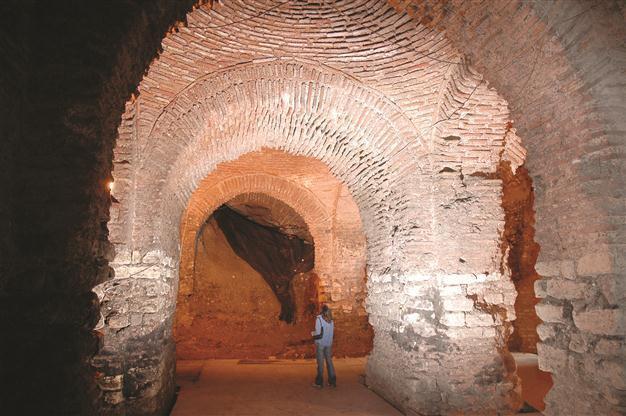Ancient Byzantine wall damaged to make hotel
Ömer Erbil - ISTANBUL / Radikal

The walls of an ancient Byzantine palace in the protected area of Sultanahmet have been demolished to construct a hotel.
The walls of an ancient
Byzantine palace in the protected area of Sultanahmet have been damaged and demolished to construct a hotel, eliciting anger from a number of academics.
“The buildings [in question] in Sultanahmet, were not only damaged but also demolished. Among those buildings, the Byzantine walls were also damaged even though experts from the Istanbul Archaeology Museum conducted research and wrote a report on the incident. However, the construction continued, and a company built a five-story hotel building [on the site],” 51 history, art and architecture scholars from Boğaziçi, Istanbul, Uludağ, Kapadokya, Marmara, Istanbul Technical universities said in a joint statement to protest the destruction after daily Radikal broke news of the initial damage.
The scholars said they were observing the incident with concern.
The first-degree protected area in Sultanahmet contains many archaeological and ancient sites. The law in question did not permit the demolition of the walls. The hotel, meanwhile, is now five stories high.
A similar situation occurred during the construction of the Eresin Hotel, although the edifice has now become a semi-museum to keep ancient artifacts.
The situation concerning the Byzantine palace was noted Dec. 15, 2011, by officials and was reported to Fatih Municipality. According to a written statement from the foundation to protect historical artifacts, the construction should have been stopped immediately.
Cyprus Monastery Damaged
NICOSIA – The Associated Press
A historic monastery where an apostle of Jesus Christ is said to have performed miracles is close to caving in and needs immediate repairs, the leader of Cyprus’ Orthodox Christian Church said Feb. 20. Archbishop Chrysostomos II urged Greek Cypriot pilgrims not to travel to the Apostolos Andreas, or Saint Andrew, monastery in Turkish Cyprus for fear it could collapse. He said if Turkish Cypriot authorities did not act fast, he would dispatch restoration crews to prop up the monastery’s crumbling central archway, possibly stoking tensions on the divided island.
Chrysostomos’ account was immediately disputed by Turkish Cypriot officials, who said authorities were keen to protect the island’s cultural heritage and added that a restoration program was already under way. “we see this as part of the common cultural heritage of Cyprus,” official Kudret Özersay said.
Archaeology Foundation President Necmi Karul said the demolition of the palace for a hotel was vandalism. “How can they do it in the old quarter of Istanbul? There is a law, but it is only on the paper. No one is checking what is going on.”
The damage report reached the fourth Protection Committee on Jan. 18, 2012. Fatih Municipality, however, was reportedly very late in reporting the demolition.
“Even though the municipality decided to demolish the five-story building, this decision will not bring the Byzantium walls back,” said the scholars’ statement. “It is a must to solve the problems in the beginning, rather than taking care of things after the damage has been done.” Istanbul’s Byzantine and Ottoman remains are on the UNESCO World Heritage List.
Turkey,
